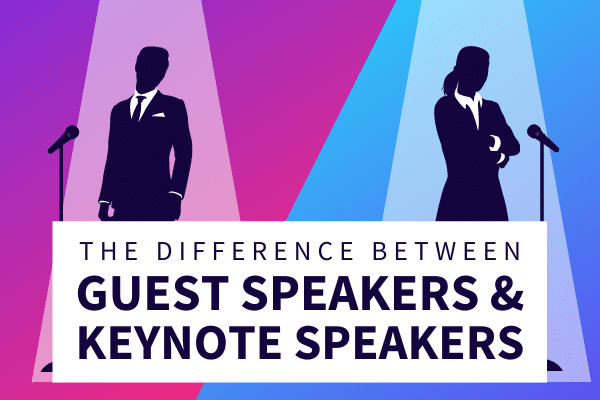In just about any profession, the key to success is knowing your role, and professional speaking is no exception. When you prospect for speaking leads, for example, are they looking for guest speakers or keynote speakers? How long do they expect their speaker’s presentation to be? What’s the ideal tone, content, and approach for your presentation, and what do they hope their attendees will gain from it? In all of these areas, the more you know, the greater your chance of succeeding. Combine that knowledge with knowing your role – and, by extension, how to exceed their expectations – and you’re sure to succeed.
So, where are we going with all this? Simple. If you’re going to ramp up your career and fine-tune it as you go, you need to know the specific differences between being a guest speaker versus being a keynote speaker. That way, before your next sales call, you can know your angle ahead of time and approach the opportunity accordingly.
With that in mind, in this guide, we’re going to answer the question, “What is the difference between guest speakers and keynote speakers?” We’ll also look at this distinction from both sides of the aisle, the first being those who are speakers (or aspiring speakers), and the second being those hiring speakers.
What is a keynote speaker?
First, let’s start with the basics: What exactly is a keynote speaker? Simply put, a keynote speaker is the lead speaker for an event or a conference. Although there may be two keynote speakers – one at the start of the event and a second at the end – most events opt for a single keynote speaker at the beginning. Occasionally, there are events with multiple keynote speakers, but these are relatively rare.

Beyond that, the role of the keynote speaker is usually to set the tone for the event. This can be done in many ways, such as through motivational or inspirational elements, storytelling, or theatrical performances. Depending on the hosting organization’s industry and focus, one or more of these elements can be appropriate in the keynote speech.
Let’s take an industry-specific conference, for example. For this kind of event, the keynote speaker may choose to deliver a state-of-the-industry speech, to ensure the audience begins the event on the same page. Alternatively, they may focus on company news, product developments, or perhaps a shift in the industry as a whole.
In any case, the keynote speaker is responsible for delivering any overt or hidden messages associated with setting the tone. Generally, this means following a script of sorts, but some keynote speakers may take their own approach, especially if their individual goal is to be dynamic and inspiring.
However, keynote speakers are also usually chosen because they have a high level of visibility in their chosen industry and a unique level of expertise. This gives them the authority to give an overview of the industry, positioned as an expert, and, to some degree, approach the keynote with their own flair and personal style. It also means they can generally command a higher fee than standard guest speakers.
What is a guest speaker?
Speaking of guest speakers, let’s jump into the second half of the equation: What exactly is a guest speaker? For the most part, guest and keynote speakers are relatively similar in terms of speaking capability. That said, between the two groups, there are a few key differences.

For one thing, guest speakers aren’t typically hired to open an event or set the tone. Instead, they’re hired for a variety of other purposes in order to add value for attendees after the opening keynote. Many events, for example, hire guest speakers to focus on a specific subtopic of the event in detail. Another reason they may be hired is to break up the more serious segments of a multi-day event or to provide a unique perspective on the overarching theme of the event. Either way, while keynote speakers are the “lead” of an event’s speaker roster, guest speakers fulfill the “supporting” roles.
Similarly, the second key difference between guest speakers and keynote speakers is how much of their career depends on professional speaking. For keynote speakers, speaking is usually a full-time career. By contrast, guest speakers generally focus on speaking as a part-time component of their career or are full-time speakers that are still building their speaking businesses.
Nonetheless, whether a speaker falls into the “keynote” or “guest” category depends largely on the event in question. A full-time speaker, for example, may deliver the keynote for a mid-sized event in their industry but act as a guest speaker for an event with more prestigious industry experts. Think of it like the biological example of “All thumbs are fingers, but not all fingers are thumbs”. In the speaking industry, all keynote speakers can be guest speakers, but not all guest speakers can deliver keynotes.
When do event planners hire a keynote speaker?

In total, there are many reasons why an event organizer might hire a keynote speaker, most of which depend on the nature of the individual event. Leading up to it, organizers have to keep in mind a number of questions, such as “How big is it?” and “Is the tone of the event or conferences loose and free-wheeling, or buttoned down?” Most importantly, they also have to ask themselves, “What’s the overall goal and purpose, and how is the event organized to achieve those specific ends?”
From there, planners break these different elements down and match them to specific reasons to hire a keynote speaker. If it’s a large, “buttoned-down,” conference, for example, event planners might hire a keynote speaker to educate and motivate attendees. If it’s a fundraising event, planners might hire a keynote speaker to promote awareness for the theme of the event. In short, many of the event planner’s keynote speaker requirements depend on the needs of the event as a whole. But, the main reason to hire one is still to kick off the event with a bang.
At that point, after finding keynote speakers that meet the event criteria, a secondary reason to hire one is to help the audience members connect with the event material. In any industry, it’s not exactly challenging to find marketing experts, motivational speakers, or even industry professionals who can analyze trends and forecast future industry changes.
However, hiring a keynote speaker that relates to the audience elevates these benefits. After all, no one really loves learning about marketing statistics or industry trends. But, if event planners find someone that makes it interesting from the beginning – and connects with their audience – everything else about the event automatically becomes worth listening to.
When do event planners hire guest speakers?
On the flip side, because of the supporting nature of guest speaking, event planners don’t always have to be as meticulous when hiring a guest speaker. They simply have to choose a speaker that reinforces the theme(s) outlined by the keynote speaker and builds on a related topic.

This added flexibility allows event planners to choose guest speakers for a wide range of reasons. For example, at a multi-day event, guest speakers may be hired to share their specific experience related to the total event theme or to emphasize the importance of a new technology or technique. Conversely, at a small corporate event, guest speakers may be hired standalone, to accomplish a single one of these goals as part of a one-day event.
In some cases, though, event planners take a completely different approach and hire guest speakers simply to provide a change of pace. These include:
- Hiring a guest lecturer or educational speaker to re-engage student audiences.
- Bringing in industry experts to present on recent industry changes or challenges.
- Working with a facilitator to inspire your audience and help them connect with each other.
- Enlisting a magician or hypnotist to present a motivational speech with a dose of humor.
In these instances, guest speakers may even be celebrities from outside the industry or the scope of the event. More often than not, however, event planners hire guest speakers to add support for their audience. Sometimes, that support is in conjunction with a keynote speaker, sometimes not. As with keynote speakers, the exact purpose of a guest speaker’s presentation depends on the individual event.
What do event planners look for in a speaker?
But, whether you’re a guest speaker or a keynote speaker, what makes you stand out? For better or worse, there are many different answers to this question. So, let’s break down the most noteworthy ones first.
Industry Intelligence
First, event planners consider the speaker’s level of knowledge. This may seem obvious and fundamental, but if the event in question is technical, a visionary speaker may lack the necessary chops to connect with attendees at the desired level. Likewise, if the event is narrowly focused, the level of knowledge takes on far more importance in framing the search. If you’re a motivational speaker, for example, that’s undeniably useful but you won’t necessarily be well-suited for an in-depth cryptocurrency conference.
Speaking Ability
Second, event planners look for a speaker’s ability to connect with people. No one wants to sit through a speech from a speaker who lacks basic knowledge of pacing, presentation, and how to engage an audience. Consequently, event planners almost always want to see the mastery of specific skills. These include timing, a sense of narrative, and the ability to include stories, in addition to the requisite ability to present specific techniques and use data and analysis to support the presentation.
Relevance
Third, planners look for speakers that are relevant. Is the speaker a match with what their attendees are looking for? Is the presentation likely to stray? Will they need to reel in a prospective speaker, or can he or she stick to a script? All of these answers may affect their decision.
Speaking Fees
Fourth, another aspect event planners consider when hiring keynote or guest speakers is their event budget. Although it’s important not to go over budget, it can be easy for planners to fixate on the glitz of a high-profile speaker before seeing their fee. To avoid this, many planners look for a diamond in the rough. Some of the best speakers are lesser-known people whose value makes up for the “glitz” they lack. As an aspiring speaker, this is one of the most important considerations to keep in mind, especially if you hope to eventually increase your speaking fees.
Diversity
Finally, the majority of event planners also look at the diversity of their speakers. Well-organized events tend to vary when it comes to the gender and race of the speakers, in order to provide different opinions and angles of the main topic. In fact, according to a 2020 study by the Professional Convention Management Association (PCMA), 56% of event planners include diversity goals in their speaker hiring process. With that in mind, if you’re not chosen for a given event, don’t take it to heart. In some cases, event planners may have absolutely loved to hire you. They just wanted to give someone with less visibility a chance to be heard.
So You Want to Be a Keynote Speaker…
If you’re an aspiring keynote speaker, there are a handful of things you can do immediately to increase your credibility. These include establishing – or modernizing – your personal brand and investing in the visibility of your speaking business. This can be done through a variety of avenues, such as sales and marketing efforts, social media campaigns, and an updated website. But, of all these ways to grow your speaking business, the key thing to remember is not to neglect them.
If you’re already actively marketing yourself as a keynote speaker, on the other hand, the key important thing to remember is to do your homework in advance. Before each event, make sure you know the event details, who is hosting it, and what the event planner hopes to gain for their audience. Additionally, plan ahead of time how you want to position yourself and the mechanics of your presentation. Beyond writing a great speech and knowing your message, you also need to anticipate how the audience will perceive you and organize your presentation with that in mind. That way, you can be confident of your positive impact (even after leaving the stage). Plus, your client will want to invite you back for future events. Win, win!
So You Want To Be a Guest Speaker…
Conversely, if your goal is to be a guest speaker and you’re just starting out, start with the basics. Rather than focusing solely on stagecraft or finding speaking opportunities, start by building your reputation in a certain niche or two. Among the SpeakerFlow team, we have a saying that “niches lead to riches”. In other words, tailoring your content to a specific audience will make it easier for you to sell your services.
From there, like a keynote speaker focuses on promoting their personal brand, focus on building yours. From your sales collateral to your presentations, the more you prepare, the more event planners will want to hire you. And the more planners hire you, the quicker you’ll segue into keynote speaking, if you want to speak full-time.
For more information about starting a speaking business, check out our previous guides, including “How To Start A Speaking Business: The Ultimate Guide” and “7 Professional Speakers To Model Your Business After.”
Additionally, to learn more about how you can grow your speaking business – with the help of technology customized to the speaking industry – check out our operating system or drop us a line at [email protected]. 👍






